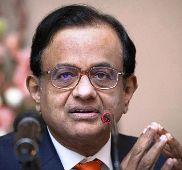 | « Back to article | Print this article |
 The biggest threat to reforms in India is an unstable government at the Centre after 2014 elections, Finance Minister P Chidambaram said on Wednesday reaffirming government's commitment to reforms and confidence about passage of pension and insurance bills in Parliament's Budget session beginning next month.
The biggest threat to reforms in India is an unstable government at the Centre after 2014 elections, Finance Minister P Chidambaram said on Wednesday reaffirming government's commitment to reforms and confidence about passage of pension and insurance bills in Parliament's Budget session beginning next month.
‘Behind the noise’ there were quiet negotiations with the Opposition parties and support from them on these legislations, according to a note by Bank of America Merrill Lynch, who co-hosted an investor conference with DBS.
Addressing over 300 city-based FIIs, debt investors and corporates, Chidambaram, who is on the second leg of his east Asia tour wooing foreign investment, said the goods and service tax regime is a major reform and hoped that the legislation would be approved by Parliament in the winter session in December this year.
He acknowledged that the GST Bill was unlikely to be passed by April 2013 but hoped to introduce in the monsoon session and get it passed in the winter session of Parliament based on a consensus with states.
While efforts would be made to widen the tax base, Chidambaram expects the government revenues to rise by 20 per cent every year though not by raising rates but by through stable tax regime, non-adversial compliance and fair dispute mechanism.
He said the fiscal target in 2012-13 would be maintained at 5.3 per cent of the GDP which would be achieved through cost cuts and austerity measures.
The Finance Minister promised a 0.6 per cent reduction in the fiscal deficit every year to bring the deficit to 3 per cent by 2016-17 without raising tax rates.
He expected the gross domestic product growth rate to be 5.7 per cent this year and around 6-7 per cent in 2013-14 and 8 per cent in 2014-15.
Chidambaram said the newly formed Cabinet Committee on Investments would speed up project approvals.
The CCI would for the first time meet before end of this month in which clearances to 47 oil and gas blocks would be considered.
The next meeting would take up coal and other minerals, he said, adding the process would speed up removal of inter-ministerial disputes which hamper implementation of projects.
The Minister further said that take-out financing by Infrastructure Development Funds would free bank finances and encourage them provide money for fresh projects.
Referring to the issue of General Anti Avoidance Rules, Chidambaram said most of the issues have already been sorted out.
The Minister has earlier said that "ghost" of GAAR had been "buried".
Noting that rising Current Account Deficit, which reflects the difference between inflow and outflow of foreign exchange, was a 'tricky' issue, the Minister said it would be curtailed in the near term.
He also expressed the confidence that India would be able to bridge the gap through capital flows.
On the issue of disinvestment, Chidambaram said the government has drawn a time-table to achieve the target of Rs 30,000 crore (Rs 300 billion).
The next in line to hit the capital market is power major NTPC which would fetch the exchequer about Rs 11,000 crore (Rs 110 billion), he said.
The government has so far raised Rs 6,900 crore (Rs 69 billion) from stake sale in the PSUs.
On the issues concerning regulatory issues, Chidambaram said contrary to perception, Finance Ministry and Reserve Bank of India work closely.
RBI has the autonomy to do its tasks of controlling inflation, he added.
As regards other regulators, the Minister said Insurance Regulatory and Development Authority and RBI have become more consultative in their approach.
The Securities Appellate Tribunal has only 40 cases pending which would be cleared in two months, the Minister said.
Referring to the recently launched Direct Benefit Transfer scheme, Chidambaram said that it would help in reducing leakages in government schemes.
The pilot projects indicate that there could be a saving of 20 to 60 per cent in subsidies.
As regards steps to boost investment, he said the cap for debt investments has been raised to $75 billion and the Ministry is looking at ways to tweak various sub-caps to accelerate debt investments.
The Minister also expressed the confidence that the savings rate would move up to 36 per cent from 32 per cent currently as a result of measures to halt government dis-savings and promote household savings.
These initiatives, he added, would also help in achieving an investment rate of 38 per cent.
The public sector undertakings, he added, has already been asked to achieve investment target by March.
In case they don't invest the money, they will be asked to return the surplus fund as special dividend to the government, he said.
Image: P Chidambaram